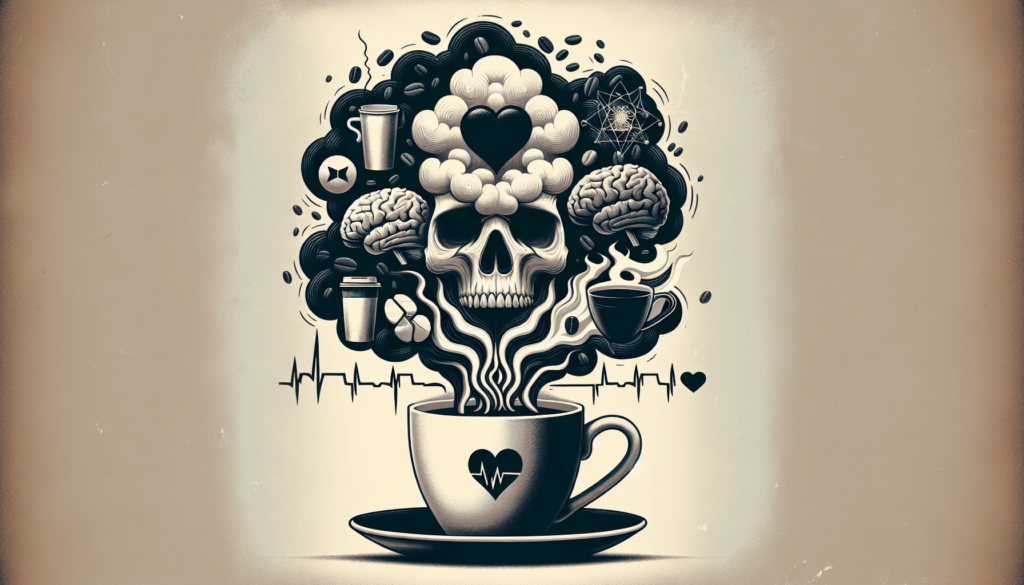Do you find yourself reaching for a cup of coffee first thing in the morning and relying on it throughout the day for an energy boost? Well, you may want to think twice before taking that next sip. In this article, we will explore the reasons why you should consider staying away from coffee and the potential benefits that could come from breaking the habit. From the impact on your sleep patterns to the potential for dependence, we will uncover the truth behind this popular beverage. So, grab your favorite non-caffeinated drink and let’s dive into why you may want to reconsider your daily coffee fix.

Negative Effects on Sleep
Disruption of Sleep Patterns
Drinking coffee, especially in the afternoon or evening, can disrupt your natural sleep patterns. The caffeine in coffee stimulates your central nervous system, making it harder for you to fall asleep at night. Even if you do manage to fall asleep, the quality of your sleep may be compromised. You may find yourself tossing and turning throughout the night, experiencing fragmented sleep and waking up feeling unrested.
Insomnia
Regular consumption of coffee can lead to chronic insomnia. Insomnia is a sleep disorder characterized by difficulty falling asleep, staying asleep, or both. This can have a significant negative impact on your daily life, leaving you feeling tired, irritable, and unable to concentrate. If you’re struggling with insomnia, it’s worth evaluating your coffee intake and considering cutting back.
REM Sleep Disturbance
REM sleep is a crucial stage of the sleep cycle associated with dreaming and memory consolidation. However, consuming coffee close to bedtime can disrupt your REM sleep. This means that even if you manage to sleep, you may not be getting the deep, restorative sleep that your body needs. Over time, this can lead to a range of negative effects on your overall health and well-being.
Increased Anxiety and Stress
Heightened Anxiety Levels
For some individuals, coffee can increase feelings of anxiety and contribute to the development or worsening of anxiety disorders. The caffeine in coffee stimulates the release of stress hormones such as cortisol and adrenaline, which can leave you feeling on edge and more prone to anxiety symptoms.
Stress Response Activation
When you consume coffee, it activates your body’s stress response system. This can be beneficial in certain situations, providing a temporary energy boost and heightened alertness. However, chronic activation of the stress response can lead to negative health effects. Regularly consuming coffee can keep your stress response system in overdrive, leading to persistent feelings of stress and potentially contributing to the development of chronic stress-related conditions.
Sleep Disorders
As mentioned earlier, coffee can disrupt your sleep patterns, leading to insomnia. However, the link between coffee and sleep disorders extends beyond insomnia. Consuming caffeine, particularly in large amounts or close to bedtime, can contribute to the development of sleep disorders such as sleep apnea and restless leg syndrome. These conditions can further worsen sleep quality and exacerbate the negative effects of coffee on sleep.
Dependency and Addiction
Caffeine Dependency
Regular consumption of coffee can lead to caffeine dependency. This means that your body becomes accustomed to the effects of caffeine, and you may require increasing amounts of coffee to achieve the same level of alertness. This can create a cycle of dependency, where you rely on coffee to function in your daily life and experience withdrawal symptoms when you try to cut back or quit.
Withdrawal Symptoms
If you’ve ever tried to quit coffee after being a regular consumer, you may have experienced withdrawal symptoms. These can include headaches, fatigue, irritability, difficulty concentrating, and even flu-like symptoms. The severity and duration of withdrawal symptoms vary from person to person, but they can be quite unpleasant and make it challenging to quit coffee.
Increased Tolerance
Over time, your body can develop a tolerance to the effects of coffee. This means that you’ll need to consume higher amounts of coffee to feel the same energizing or alertness-boosting effect. Increased tolerance can further fuel coffee dependency and make it harder to cut back or quit.
Digestive Issues
Acid Reflux and Heartburn
Coffee is known to stimulate the production of stomach acid, which can exacerbate acid reflux and heartburn symptoms. If you have a sensitive stomach or suffer from gastroesophageal reflux disease (GERD), drinking coffee can lead to discomfort, pain, and a burning sensation in your chest. It’s best to avoid or limit coffee consumption if you struggle with these digestive issues.
Stomach Ulcers
Coffee consumption has been linked to an increased risk of developing stomach ulcers. The combination of the acidity in coffee and the stimulation of stomach acid production can irritate the lining of your stomach and contribute to the formation of ulcers. If you already have a stomach ulcer, coffee can worsen your symptoms and delay the healing process.
Irritable Bowel Syndrome
Coffee can also worsen symptoms of irritable bowel syndrome (IBS). The caffeine in coffee acts as a stimulant to the intestines, which can lead to increased bowel movements, diarrhea, and abdominal discomfort. If you have IBS, it’s advisable to limit or avoid coffee to prevent exacerbating your symptoms.

Dehydration
Diuretic Effects
Coffee has diuretic properties, which means that it increases urine production and can contribute to dehydration. While the diuretic effect may not be significant enough to cause severe dehydration in most individuals, it’s still important to be mindful of your water intake, especially if you consume coffee regularly.
Water Loss and Electrolyte Imbalance
The diuretic effect of coffee can lead to water loss, which can disrupt the balance of electrolytes in your body. Electrolytes are essential for maintaining proper hydration and ensuring the smooth functioning of various bodily processes. When your electrolyte balance is thrown off, you may experience symptoms such as muscle cramps, fatigue, and dizziness.
Increased Urination
If you regularly consume coffee, you may find yourself needing to urinate more frequently. This can be inconvenient, particularly in situations where access to a restroom may be limited. Increased urination can also disrupt your sleep, especially if you have to wake up multiple times during the night to use the bathroom.
Negative Impact on Cardiovascular Health
Increased Blood Pressure
The caffeine in coffee can temporarily increase blood pressure, particularly in individuals who are sensitive to its effects. While the increase in blood pressure is typically modest and temporary, prolonged high blood pressure can contribute to the development of cardiovascular diseases such as heart disease and stroke.
Higher Risk of Heart Disease
Several studies have suggested an association between regular coffee consumption and an increased risk of heart disease. While the exact mechanisms are still being researched, it’s believed that coffee’s impact on blood pressure, cholesterol levels, and inflammation may contribute to this increased risk. If you already have existing cardiovascular issues, it’s advisable to consult with your healthcare provider about your coffee intake.
Irregular Heart Rhythm
Coffee has been known to trigger irregular heart rhythms, such as palpitations. These irregularities can be unsettling and may cause feelings of discomfort or anxiety. If you experience these symptoms after consuming coffee, it’s important to discuss them with your healthcare provider to rule out any underlying heart conditions.

Dental Health Problems
Tooth Staining
One of the most noticeable effects of regular coffee consumption is tooth staining. The pigments in coffee can adhere to the enamel of your teeth, leading to yellowing or discoloration over time. While there are various teeth whitening options available, prevention by reducing coffee intake or practicing good oral hygiene is the ideal approach.
Bad Breath
Coffee can also contribute to bad breath or halitosis. The strong aroma of coffee can linger in your mouth, even after brushing your teeth. Additionally, coffee consumption can decrease saliva production, which can further contribute to dry mouth and bad breath. Maintaining good oral hygiene and staying well-hydrated can help mitigate these effects.
Gum Disease
Coffee consumption has been associated with an increased risk of gum disease. The acidic nature of coffee can irritate the gums and contribute to inflammation. Over time, this can lead to gingivitis or periodontal disease, which can cause gum recession, tooth loss, and other oral health issues. Maintaining a consistent oral hygiene routine and limiting coffee consumption can help protect your gum health.
Negative Effects on Reproductive Health
Hormonal Imbalances
Coffee consumption, particularly in high amounts, can disrupt hormonal balance in both men and women. It can interfere with the production of hormones such as cortisol, estrogen, and progesterone, which play crucial roles in reproductive health. Hormonal imbalances can lead to menstrual irregularities, fertility issues, and other reproductive health problems.
Difficulties in Conceiving
For couples trying to conceive, excessive coffee consumption may hinder their efforts. Studies have shown a potential link between high caffeine intake and decreased fertility. Both male and female partners should consider reducing their coffee intake to optimize their chances of conception.
Pregnancy Complications
During pregnancy, it’s generally recommended to limit or avoid caffeine altogether. High caffeine intake during pregnancy has been associated with an increased risk of miscarriage, premature birth, low birth weight, and developmental issues in the fetus. Pregnant individuals should consult with their healthcare providers to determine the safest course of action regarding coffee consumption.

Interference with Medications
Decreased Medication Efficacy
Coffee can interfere with the absorption and efficacy of various medications. It can affect the way your body metabolizes certain drugs, leading to reduced effectiveness. If you take medications regularly, it’s important to discuss your coffee consumption with your healthcare provider to ensure that it doesn’t negatively impact your medication regimen.
Interactions with Prescription Drugs
Coffee can interact with certain prescription medications, potentially intensifying or diminishing their effects. Specifically, coffee may interact with drugs used to treat anxiety, depression, heart conditions, and other medical conditions. To avoid potential interactions, it’s crucial to inform your healthcare provider about your coffee intake and any medications you’re currently taking.
Adverse Side Effects
In some cases, consuming coffee alongside certain medications can lead to adverse side effects. For example, combining coffee with certain antibiotics or antipsychotic medications can increase the risk of cardiac arrhythmias or other serious health complications. Always consult with your healthcare provider or pharmacist to understand any potential risks and interactions.
Negative Effects on Brain Function
Memory and Cognitive Impairment
While coffee is often associated with improved alertness and cognitive functioning in the short term, excessive consumption can have the opposite effect. High levels of caffeine can disrupt your sleep patterns, impairing memory consolidation and negatively affecting cognitive performance. Long-term heavy coffee consumption has been linked to an increased risk of cognitive decline and neurodegenerative disorders such as Alzheimer’s disease.
Lowered Neurological Performance
People react differently to caffeine, and for some individuals, excessive coffee consumption can lead to lowered neurological performance. It can cause jitters, restlessness, and difficulties with coordination and fine motor skills. These effects can be particularly problematic in tasks that require precision or focus.
Decreased Focus and Attention
While coffee can provide a temporary boost in focus and attention, overconsumption or dependency on coffee can lead to decreased focus and attention in the long run. Regularly relying on coffee for productivity can create a cycle of energy crashes and difficulty concentrating without caffeine. Balancing your coffee intake and adopting healthy lifestyle habits can help you maintain sustained focus and attention without relying solely on coffee.
In conclusion, while coffee may be a beloved beverage for many, it’s important to acknowledge the potential negative effects it can have on various aspects of health. From disrupting sleep patterns and increasing anxiety to contributing to dependence and addiction, coffee should be consumed in moderation and with careful consideration of individual health factors. It’s always best to listen to your body and consult with healthcare professionals to determine what amount of coffee, if any, is suitable for you.



